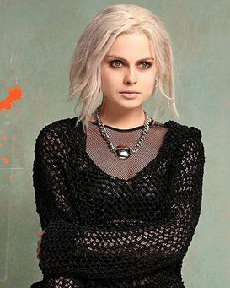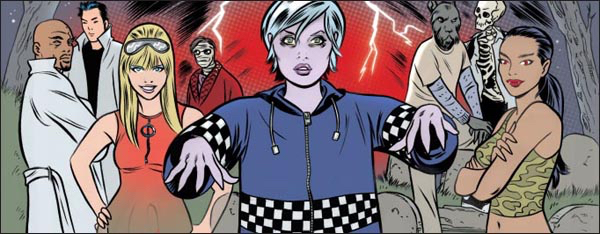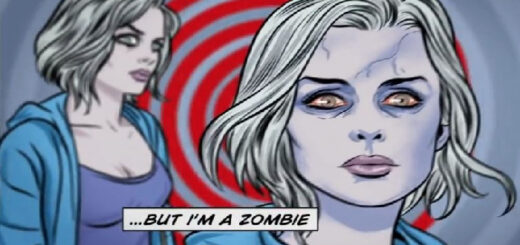Ed Catto: iCreator, Chris Roberson
It’s amazing to see the many ways comics, and by extension geek culture, have so thoroughly infiltrated the entertainment and marketing landscape. Comics-based movies and TV shows continue to be fruitful and multiply, while brands try to keep up and in an effort to engage fans in authentic conversations.
Amidst the continuing and exciting expansion of comics-based entertainment, I thought it might be interesting to try to understand this growth from a creator’s point of view. Anyone who has ever let a friend drive their new car, or sent a child off to school knows what it’s like to let go of something you cherish. And more than that, you fully recognize the cringe-worthy reality that the thing you cherish might come back changed. There’s always that worry that your car might be returned with a dent, or your child might come home from school with a vocabulary sprinkled with a few new #$@% words.
 Sadly, comics do have a long history of creators not being rewarded fairly or sharing in the ultimate success of their creations. So I was especially curious how the newer breed of creator feels about letting others take charge of their creations. How do creators approach it and plan for it in 2015?
Sadly, comics do have a long history of creators not being rewarded fairly or sharing in the ultimate success of their creations. So I was especially curious how the newer breed of creator feels about letting others take charge of their creations. How do creators approach it and plan for it in 2015?
I reached out to Chris Roberson, a brilliant comics writer who’s created adventures for a wide range of characters (everyone from Superman to The Shadow), has created his own characters and leads the charge for creator-owned comics, along with Allison Baker, at Monkeybrain Comics. At DC Entertainment’s Vertigo imprint, Chris and artist Michael Allred created the iZombie series, which is now enjoying a new life, resurrected as a hit series on the CW network.
 Ed Catto: Can you tell me a little bit about what you were trying to create with your iZombie comic series and provide some background?
Ed Catto: Can you tell me a little bit about what you were trying to create with your iZombie comic series and provide some background?
Chris Roberson: I’ve always liked the zombie genre, but had begun to feel like it was unnecessarily locked into a post-apocalyptic setting. I wanted to try setting a zombie story in the modern day, with society still up and running, but with strange things happening in the shadows. And to take it one step further, to have the zombie be the point-of-view character. Everything else kind of followed from there!
EC: Were you happy with how the comic series turned out? And what would you have done differently if you could go back do it over again?
 CR: Oh, definitely! I’m really proud of the work that Mike and Laura Allred and I did with the series. My only regret was that we never got a chance to get a giant kaiju monster on stage. That would have completed the set!
CR: Oh, definitely! I’m really proud of the work that Mike and Laura Allred and I did with the series. My only regret was that we never got a chance to get a giant kaiju monster on stage. That would have completed the set!
EC: What was it like when you found out that your iZombie concept was going to be a series? How long did it take to reach network television and can you tell us some of your reactions and thoughts along the way?
CR: I think the first we heard about the series being in development was late summer or early fall of 2013, and by early 2014 we’d been sent a copy of the pilot script to read. We visited the set last spring, met the producers and some of the cast, and in general were really impressed with everyone involved. Over this past winter we were sent rough cuts of the first four episodes, and were just blown away by how fantastic they were!
 EC: What’s your involvement in the TV series now? What’s your reaction to what they’ve done and what they’re doing?
EC: What’s your involvement in the TV series now? What’s your reaction to what they’ve done and what they’re doing?
CR: I like to say that we are “informed but not involved.” They have kept us in the loop at each stage of the process, and are happy that we’re pleased with the way the series has turned out. But otherwise, I’m just a member of the audience! (Though one with a proprietary financial stake in the show…)
EC: Comics have a sad history of many creators not fully partaking of the economic success of their literary creations. Fans are well versed on everything from the tragic story of Siegel & Shuster to Gerry Conway’s recent posting about being excluded from creator credits of certain DC characters. Here’s the question – do you think today’s creators are better prepared to protect their own rights, or is it still the same old story?
CR: I think it depends on the creator. Sure, many of us know to walk away from a bad deal, but there are always going to be hungry young creators who are more than willing to sign away all their rights in return for far too little. But I think that there’s a difference, too, between work-for-hire and creator owned stuff. When I do a work-for-hire project, it’s usually because I want to work with those characters or concepts, and will happily surrender rights that I would never dream of giving up for an original property of my creation.
EC: As a follow-up question, can you tell us a little bit about how you’ve organized your publishing endeavor, Monkeybrain Books & Comics?
CR: It’s pretty simple, really. We only license the digital rights, and only for a period of five years. All the other rights are retained by the creators. Which is why you see print editions of Monkeybrain titles coming out from IDW, or Dark Horse, or Image, or what-have-you. The creative teams are free to make whatever deal suits them best.
EC: What’s coming up next for you?
CR: I am doing some amazingly cool work-for-hire stuff for Dark Horse that hasn’t been announced yet, but which is keeping me VERY busy. My bucket list is getting very short!
EC: Thanks for the insights and the time, Chris.











